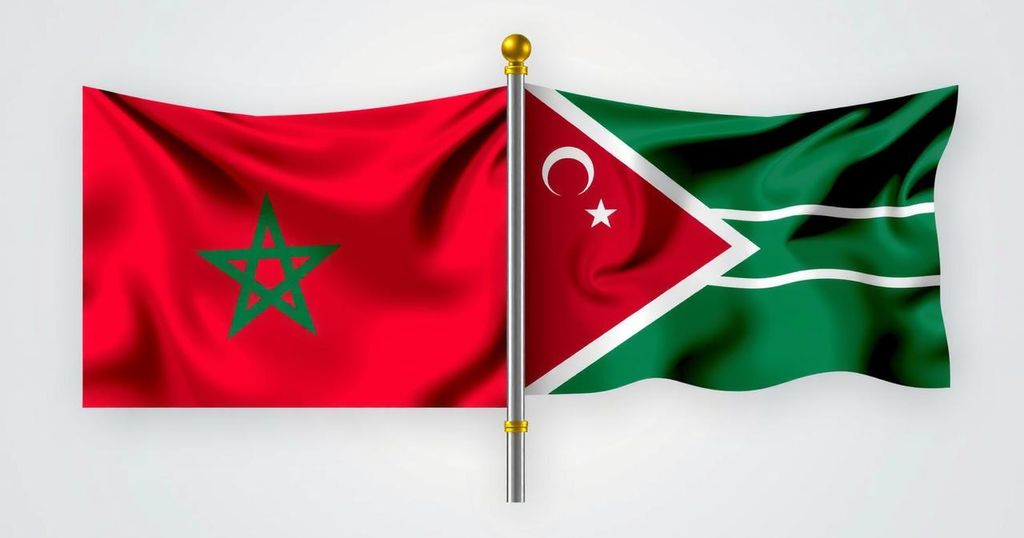Morocco and Mauritania are enhancing their strategic partnership, particularly in light of regional challenges posed by the Western Sahara conflict. This cooperation encompasses diplomatic efforts, security collaboration, and economic initiatives, including key projects like the Atlantic maritime port of Dakhla and the Nigeria-Morocco gas pipeline, enhancing both nations’ roles in regional integration and stability.
The strategic relations between Morocco and Mauritania have evolved significantly, particularly in the context of the ongoing Moroccan Western Sahara conflict. Mauritania, positioned strategically between Algeria to the east and Morocco to the north, plays a pivotal role in addressing regional tensions. Recent diplomatic engagements, notably a meeting between King Mohammed VI and Mauritania’s President Mohamed Ould Ghazouani, indicate an improving rapport between the two nations.
Historically, the relations between Morocco and Mauritania are anchored in mutual interests that emphasize regional integration and security collaboration. Over the years, both countries have established a robust partnership that encompasses various dimensions, including cultural, political, economic, and security cooperation. Their geographic proximity allows them to address shared challenges effectively, particularly in combating terrorism, organized crime, human trafficking, and illegal migration.
The geopolitical landscape poses additional challenges for Mauritania due to external pressures from Algeria, particularly regarding the Moroccan Sahara dispute. Nonetheless, Mauritania has opted for a neutral stance, seeking to facilitate a conducive political and economic atmosphere in the region while actively participating in initiatives like the Nigeria-Morocco gas pipeline. This strategic collaboration aids in managing trade routes, especially through pivotal sites such as the Guerguerat crossing, which is vital for economic exchanges.
As Morocco develops its southern provinces to enhance regional economic strategies, projects such as the Atlantic maritime port of Dakhla emerge as significant components of this vision. This port serves as a logistical hub poised to foster economic ties between Morocco and Mauritania while opening doors to global markets. Such infrastructure improvements offer substantial opportunities for both nations to attract international investments and facilitate trade connections.
The strategic partnership also extends to security efforts aimed at bolstering stability in the region. As both nations confront emerging threats such as arms smuggling and cross-border terrorism, coordinated military and naval collaborations will strengthen their defense frameworks. With concerted efforts in cybersecurity and advanced surveillance, the Moroccan-Mauritanian alliance presents a comprehensive approach to addressing these complex security challenges.
In the broader context of regional cooperation, the relationship between Morocco and Mauritania provides a promising model of collaboration that combines strategic objectives with shared interests. Initiatives like the Atlantic Gas Pipeline and the Open Atlantic Initiative are reflective of this commitment, showcasing the potential for African nations to work collectively towards stability and development.
To fully realize their strategic partnership, Moroccan-Mauritanian relations must embrace flexibility and an open-minded political framework. Sustainable success depends on the establishment of a robust economic alliance that fosters mutual development and addresses shared challenges. By nurturing key infrastructural projects and regional collaboration, both countries can shape a transformed and integrated geopolitical landscape in North Africa, providing a blueprint for enhanced prosperity across the continent.
The historical context of Moroccan-Mauritanian relations is set against the backdrop of regional conflicts and the pursuit of stability and development. The Moroccan Western Sahara conflict has heightened Mauritania’s role as a significant player in the Maghreb region, where its geographical positioning is critical for diplomacy and peace efforts. As external pressures, particularly from Algeria, affect this dynamic, realizing effective cooperation between Morocco and Mauritania is increasingly crucial for regional integration and security initiatives.
In conclusion, the strengthening of ties between Morocco and Mauritania represents a strategic opportunity for both nations to enhance regional stability, foster economic growth, and address shared security challenges. With an emphasis on infrastructure development and sustainable partnerships, it is imperative for both governments to maintain flexible and cooperative diplomatic frameworks. Such efforts will not only benefit Morocco and Mauritania but could serve as a template for broader African cooperation aimed at achieving lasting prosperity and security across the continent.
Original Source: moderndiplomacy.eu






